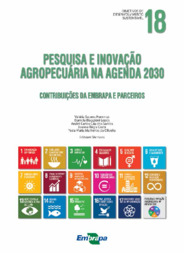Embrapa leads Brazilian participation in the Science Summit during the UN General Assembly
Embrapa leads Brazilian participation in the Science Summit during the UN General Assembly
In order to show how Brazilian science has been contributing to the attainment of the 17 Sustainable Development Goals (SDGs), a Embrapa will participate in the Science Summit at the 78th United Nation General Assembly (SSUNGA78). The event will be held in New York, USA, on September 12 -29, in parallel with the 78th session of the UN General Assembly, and will focus on the role and contribution of science in achieving the SDGs and the Agenda 2030. There will be more than 300 lecture sessions, 200 of them held both online and in person, and the rest only online.
The goal of SSUNGA78 is to discuss the political, regulatory and financial conditions for scientific mechanisms to operate globally and effectively in support of achieving the SDGs. Scientific discovery through the analysis of massive data sets is a reality, and the organizers' understanding is that, in order for the SDGs to be achieved, it is necessary to boost collaboration across nations for the generation and sharing of research, development and innovation data, specifically on the themes that compose Agenda 2030.
Embrapa's participation is promoted by the Embrapa SDG Network and in coordination with the Brazilian Government. In order to show the contribution of Brazilian science to the achievement of the SDGs, Embrapa will organize four sessions of lectures in a virtual environment on September 18 that will feature lectures in English by researchers and experts from the research institution, the Brazilian Ministries of Agriculture and Livestock (Mapa), Agrarian Development and Family Farming (MDA) and Science, Technology and Innovation (MCTI), as well as the Oswaldo Cruz Foundation (Fiocruz).
Participation in the lectures is free, with spots limited to the capacity of the virtual rooms. Click here to sign up and participate.
Boosting collaboration across nations to develop Research, Development and Innovation actions that incorporate socio-productive inclusion strategies and the socio-environmental agenda for the transition towards diverse, resilient, equitable and healthy food systems is one of the points of Embrapa's agenda. "The five axes of action of the Agenda 2030 - Peace, People, Planet, Prosperity and Partnerships - are very inspiring, especially for the area of technological and social innovation," states Ana Euler, Embrapa's executive director of Business.
“The current moment is unique, as the government strengthens the national and international agenda aiming at the democratization of research and innovation, based on the conservation of biodiversity, the fight against poverty and hungerboth in rural and urban areas, and the search for solutions against climate changes that have affected the different biomes of the country”, she adds.
The Embrapa SDG Network was asked to organize a discussion table on agricultural science at SSUNGA two years ago. According to Valéria Hammes, the network coordinator, the invitation was called for due to the work to demonstrate how the knowledge and technological solutions generated in the corporation impact 131 (77.5%) of the 169 global targets from the 17 SDGs ratified by 193 countries.
She adds that Embrapa's VII Master Plan (PDE) 11 Strategic Goals' alignment with such 131 SDG targets was given the international recognition of the 2022 FAO Champion Award by the United Nations Food and Agriculture Organization (FAO).
For the researcher, SSUNGA78 is an opportunity for Embrapa to showcase its power to transform reality for the sake of sustainable development in Brazil and the world. Based on the interconnection of Embrapa's PDE, implementation plans, projects, portfolios, technological assets, Social Report technologies and seals in publications, we can assertively communicate our contribution and can also demonstrate greater impact beyond the contributions to the agricultural sector," she remarks.
To attend the event, registrations are open for free on the official web page, following the step by step instructions through the links for the sessions.
Participation is open to anyone.
ScheduleMonday, September 18, 2023 Session 1 - Brazil: Science and Development 9h - 11h (Brasília time UTC/GMT -3) Lecture 1. Social Technology and Food and Nutrition Security - Inácio Arruda, Secretary of Science and Technology for Social Development - SEDES/MCTI, Sônia da Costa (MCTI) and Luciane Costa (MCTI)
Lecture 2. Innovation in biodiversity and the requirements of a new ecological paradigm - Glauco de Kruse Villas Bôas (Fiocruz) Moderators: Pedro Luiz Oliveira de Almeida Machado (Embrapa) and Alineaurea Florentino Silva (Embrapa) Organizer: Embrapa SDG network Link : https://sciencesummitunga78.sched.com/event/1Pcpq
Session 2 - Brazil: Agriculture and bioinputs 12h - 14h (Brasília time UTC/GMT -3) Lecture 1. Regional solutions in soil fertility management - Eder Martins (Embrapa)
Lecture 2. National Bioinputs Program - Alessandro Cruvinel Fidelis (MAPA) Moderators: Ana Euler (Embrapa), Julia Stuchi (Embrapa) and Alineaurea Florentino Silva (Embrapa) Organizer: Embrapa SDG network Link: https://sciencesummitunga78.sched.com/event/1PcqH
Session 3 - Brazil: Health and Biodiversity 14h - 16h (Brasília time UTC/GMT -3) Lecture 1. Climate changes - Osvaldo Luiz Leal de Moraes (MCTI)
Lecture 2. Eco-innovation in the context of Health and Biodiversity: A reflection focused on praxis – Glauco de Kruse Villas Bôas (Fiocruz)
Lecture 3. One health: how Brazil is inserting itself and acting - Janice Reis Ciacci Zanella (Embrapa) Moderators: Alineaurea Florentino Silva (Embrapa) and Ana Maria Costa (Embrapa) Organizer: Embrapa SDG network Link: https://sciencesummitunga78.sched.com/event/1PcrX
Session 4 - Brazil: Knowledge construction and adoption (Capacity building) 17h - 19h (Brasília time, UTC/GMT -3) Lecture 1. The construction of knowledge to promote Agroecology in the production of healthy foods, preservation of biomes and reduction of inequalities - Regilane Fernandes da Silva (MDA) and Iracema Ferreira de Moura (MDA)
Lecture 2. Towards knowledge structuring in territorial development programs – Paulo Eduardo de Melo (MAPA) Moderators: Tatiana Sá (Embrapa) and Alineaurea Florentino Silva (Embrapa) Organizer: Embrapa SDG network Link: https://sciencesummitunga78.sched.com/event/1Pcsm Learn more about the event on: https://sciencesummitunga.com/
Check the full schedule for SSUNGA78 on https://sciencesummitunga78.sched.com/ |
Breno Lobato (MTb 9417-MG)
Embrapa Cerrados
Press inquiries
imprensa@embrapa.br
Translation: Mariana Medeiros (13044/DF)
Superintendency of Communications
Further information on the topic
Citizen Attention Service (SAC)
www.embrapa.br/contact-us/sac/





